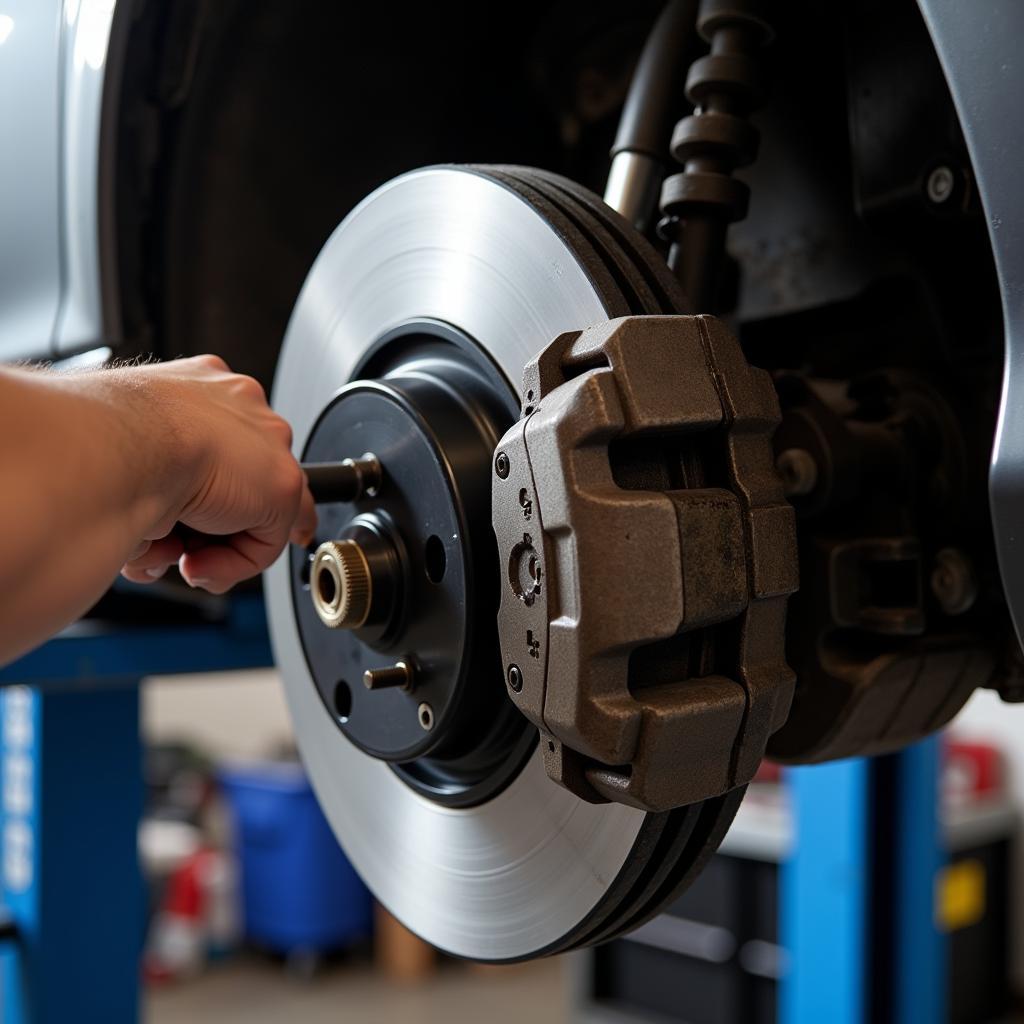Auto Services encompass a wide range of maintenance, repair, and diagnostic procedures crucial for the optimal performance, safety, and longevity of your vehicle. From routine oil changes to complex engine overhauls, understanding the various facets of auto services can empower you to make informed decisions about your car’s well-being.
The Importance of Regular Auto Services
Just like our bodies need regular checkups, our vehicles require routine maintenance to prevent minor issues from escalating into major problems. Regular auto services not only ensure a smooth and safe driving experience but also help retain your vehicle’s value and extend its lifespan.
Enhancing Vehicle Performance and Reliability
Timely auto services, including oil changes, filter replacements, and fluid top-ups, ensure that your engine operates at peak efficiency, maximizing fuel economy and minimizing harmful emissions.
 Engine Oil Change
Engine Oil Change
Ensuring Safety on the Road
Brake inspections, tire rotations, and steering system checks are vital components of auto services that directly impact your safety and the safety of your passengers.
 Brake Inspection
Brake Inspection
Preserving Your Vehicle’s Value
A well-maintained vehicle with a comprehensive service history commands a higher resale value. Regular auto services demonstrate to potential buyers that your car has been cared for meticulously, instilling confidence in its reliability.
Types of Auto Services
Understanding the different types of auto services can help you stay on top of your vehicle’s maintenance schedule and address any issues promptly.
Routine Maintenance
Routine maintenance services are preventive measures designed to keep your vehicle running smoothly and identify potential problems early on. These include:
- Oil and Filter Changes: Regular oil changes lubricate engine components, reducing friction and wear.
- Tire Rotations and Balancing: Rotating tires ensures even wear, prolonging their lifespan and improving fuel efficiency.
- Brake Inspections and Pad Replacements: Maintaining optimal brake performance is crucial for safe driving.
- Fluid Top-offs: Regularly checking and topping off essential fluids, such as coolant, transmission fluid, and brake fluid, is essential for proper vehicle function.
Repair Services
Repair services address specific issues that arise with your vehicle, ranging from minor fixes to major component replacements. These include:
- Engine Repair: Addressing engine problems, from minor tune-ups to complete overhauls.
- Transmission Repair: Diagnosing and fixing transmission issues, including fluid leaks, slipping gears, and complete rebuilds.
- Suspension Repair: Maintaining a smooth and controlled ride by addressing problems with shocks, struts, and other suspension components.
- Electrical System Repair: Diagnosing and repairing electrical faults, including battery issues, wiring problems, and sensor malfunctions.
- Heating and Cooling System Repair: Ensuring optimal cabin temperature control by addressing issues with the AC compressor, heater core, and other related components.
Diagnostic Services
Modern vehicles rely heavily on sophisticated electronic systems. Diagnostic services utilize advanced tools and techniques to identify and troubleshoot issues within these systems.
Choosing the Right Auto Service Provider
Selecting a trustworthy and competent auto service provider is crucial for the well-being of your vehicle. Consider the following factors:
- Reputation and Reviews: Research online reviews and seek recommendations from friends and family.
- Experience and Expertise: Look for a service provider with a proven track record and qualified technicians.
- Transparency and Communication: Choose a provider that clearly explains the services performed and provides detailed invoices.
- Warranty and Guarantees: Inquire about warranties on parts and labor to ensure peace of mind.
Conclusion
Auto services are an indispensable aspect of vehicle ownership, ensuring optimal performance, safety, and longevity. By understanding the various facets of auto services and choosing a reputable service provider, you can keep your vehicle running smoothly for years to come. Remember, regular maintenance is always more cost-effective than major repairs down the road.
Frequently Asked Questions (FAQs)
1. How often should I get an oil change?
It’s generally recommended to get an oil change every 3,000 miles or every 3 months, whichever comes first. However, consult your owner’s manual for specific recommendations for your vehicle model.
2. What are some signs of brake problems?
Squealing or grinding noises when braking, a soft or spongy brake pedal, and pulling to one side while braking are all indicators of potential brake problems.
3. How do I know if my car needs a wheel alignment?
If your vehicle pulls to one side while driving on a straight road, experiences uneven tire wear, or has a crooked steering wheel, it may need a wheel alignment.
4. What should I do if my check engine light comes on?
While a check engine light could indicate a minor issue, it’s best to have your vehicle inspected by a qualified mechanic to diagnose and address the problem promptly.
5. How can I find a reliable auto service provider in my area?
Ask for recommendations from friends, family, or online communities. Check online reviews and ratings, and look for service providers with certifications and affiliations with reputable organizations.
For more information on auto services in specific locations, check out our guides on auto services roanoke and a & a auto services chicago il 60618.
Need Help with Your Vehicle?
We’re here to assist you 24/7. Contact us via WhatsApp: +1(641)206-8880 or Email: [email protected] for all your auto service needs.

Leave a Reply